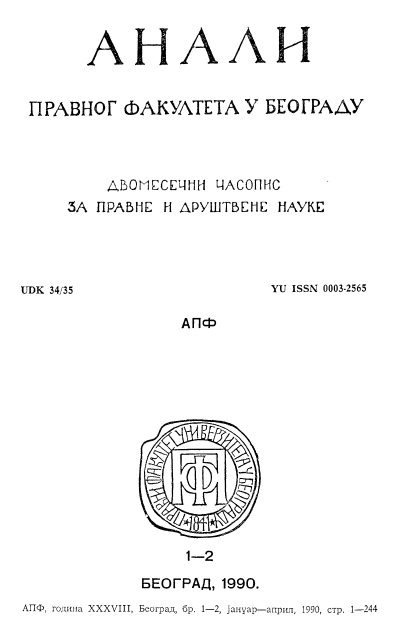КРИЗА ЈУГОСЛОВЕНСКОГ ДРУШТВА И АЛТЕРНАТИВЕ
YUGOSLAV SOCIETУ — CRISIS AND ALTERNATIVES
Author(s): Jovica TrkuljaSubject(s): Politics, History of Law
Published by: Правни факултет Универзитета у Београду
Keywords: Yugoslavia; Crisis; Bureaucracy; Alternatives; Legitimacy
Summary/Abstract: For ideal-type models of possible directions of social development and going out of crisis are analyzed in the first thematic circle, namely: etatistic, "the one of militarization of society, the model of civil society, and the socialist self-management one. These models appear at the abstract- -theoretical level of the analysis in their pure form. However, at the specific-historical level they necessarily come out as particular „junctues" and „symbioses”. While warning that the two first models would lead Yugoslav society to historical involution, the author considers that the combination of "the civil and the self-management model represents a civilizational alternative. The second circle relates to the issues of social-class and political subjects able to realize the existing concepts of surmounting the crisis by using the democratic-self-management basis. While analyzing the position of Yugoslav workers’ class as „a class in itself” subjected to pragma- tic-politicar manipulation, the neglected youth, the privileged layers, as well as the lost legitimacy of political subjects of self-management (Alliance of Communists of Yugoslavia, Trade Union Federation, and the like), the author concludes that Yugoslav society is a blocked society, since there is not enogh in it socio-class and political subjects which would be genuinely aimed at radical changes of the existing state of affairs. Finally, in the third circle new initiatives are considred which emerged in recent years. Enormous movements in contemporary Yugoslav society, namely, caused by the crisis, put to the surface great waves of strikes and mass turbulences which make possible various forms of alternative organizing and political activization of workers and citizens. This activity of Yugoslav people has dramatically pointed out ar rigidity and insufficiency of the existing political system, at sclerotic systematic shan- nels of political activity and the functionality of the out-of-syftem ways. Therefore, paradoxically, to a degree the legitimacy of existing institutions of political system were disappearing like in a sandglass, at the other side the legitimacy has intensified, as well as plausibility, of the out-of-system institutions of non-legal political activity.
Journal: Анали Правног факултета у Београду
- Issue Year: 38/1990
- Issue No: 1-2
- Page Range: 79-94
- Page Count: 16
- Language: Serbian

